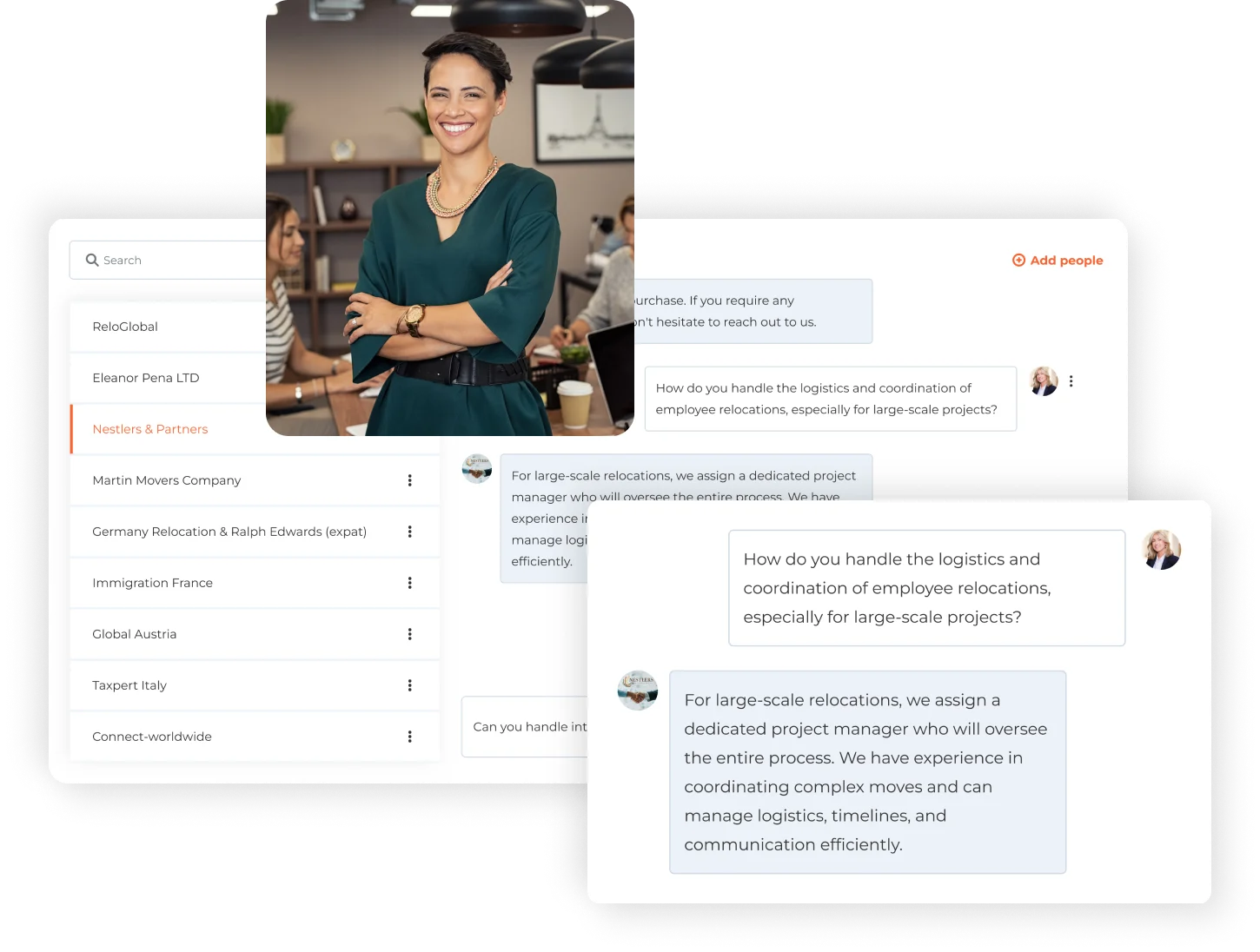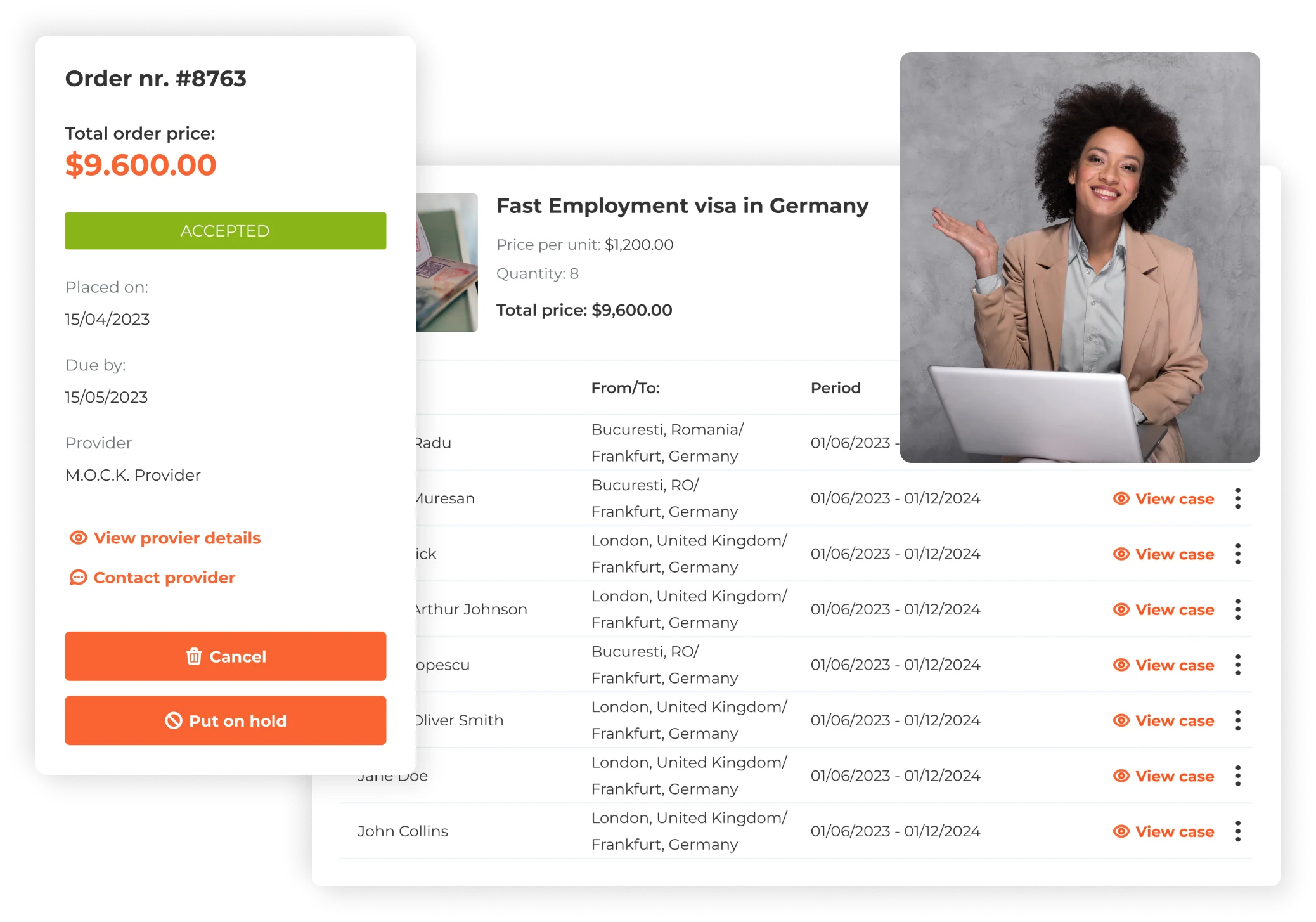Italy Checklist: Sponsoring Highly Skilled Migrant Visas
Grab a copy of a guide to international employee relocation
View E-bookManaging supplier relationships is crucial for global mobility managers dealing with expatriates and leveraging services like tax, moving, visa, and immigration. A holistic approach that treats suppliers as partners rather than transactional vendors is key for a smooth relocation experience.
Effective communication, understanding cultural nuances, and aligning strategies with suppliers’ expertise are vital for successful global mobility management. This article explores strategies for evaluating, selecting, and monitoring the right global mobility solution providers to drive competitive advantage.

Establishing clear communication channels with suppliers is crucial for effective global mobility management. Here are some strategies to consider:
Establish a clear communication path at the beginning of every new supplier relationship. Determine what data you need from suppliers and what they need from you. Ensure that the supply chain planning technology you choose easily enables back-and-forth communication, allows for status updates, and provides access to part numbers/identifiers. This streamlines the flow of information and keeps everyone on the same page.
Regular meetings with your suppliers are a great way to alleviate their concerns, address any issues, and solidify your relationship. Being transparent with your suppliers about production forecasts enables them to give advance notice about what they can deliver and when. Better yet, you and your suppliers can collaboratively determine changes or cuts needed in your short-term plan. Take it a step further by discussing how far out you need to plan and understand their capacities.
Maintaining open lines of communication and seeking mutually beneficial solutions can prevent escalation and foster long-term trade relationships. Engaging with stakeholders such as workers, consumers, and communities throughout the dispute resolution process helps to ensure that their concerns are taken into account and enhances the legitimacy and sustainability of any agreements reached.
Failing to maintain open lines of communication between parties involved in the dispute can exacerbate misunderstanding and prevent the identification of common ground. Neglecting diplomatic efforts and relying solely on legal or economic measures to address trade disputes can limit the potential for finding creative and mutually beneficial solutions.
Conflicts are going to arise in any supply chain relationship, and companies need to plan for them. Contracts should include a resolution mechanism that includes such options as a formal complaints department, mediation with the help of a neutral third party, and finally arbitration. Arbitration, where the arbitrator (one or several individuals) hears the case and makes an award, is often preferable to years of expensive litigation.
Establishing clear criteria and standards is crucial when evaluating and selecting the right global mobility suppliers. Companies should prioritize risks, gather comprehensive supplier information, and develop a risk matrix or scoring system to objectively evaluate and rank potential risks. This includes assessing factors such as financial stability, geographic location, industry volatility, past performance, regulatory compliance history, and any potential legal or ethical concerns.
Thorough vetting of suppliers is essential to gain deeper insights into their operations and risk profiles. This involves collecting and analyzing information such as financial statements, certifications, quality control processes, insurance coverage, and business continuity plans. Companies should also consider the cultural fit of the supplier, ensuring they understand the company’s business operations, employee demographics, and goals in the global mobility space.
After evaluating and selecting the appropriate suppliers, it is crucial to sign clear contracts that outline the scope, responsibilities, and expectations of the partnership. Contracts should include provisions for communication channels, performance monitoring, dispute resolution mechanisms, and contingency plans for high-risk scenarios. Additionally, companies should ensure that the contracts are transparent, fair, and compliant with applicable laws and regulations.
Companies may also consider partnering with a Relocation Management Company (RMC) to balance employee satisfaction and budget constraints, benchmark their programs, and offer positive experiences while managing costs. However, it is essential to evaluate the RMC’s fit for the organization, flexibility, responsiveness, and ability to manage program volume and complexity.
Establishing clear Key Performance Indicators (KPIs) and metrics is crucial for effectively managing and monitoring supplier performance. Companies should define KPIs that align with their organizational goals and the specific requirements of their global mobility programs. These KPIs can include measures such as:
Additionally, it is essential to incorporate Key Risk Indicators (KRIs) that assess potential risks associated with supplier performance. KRIs can include factors such as financial stability, cybersecurity risks, compliance with regulations, and geopolitical events that may impact service delivery.
Regular performance reviews are necessary to ensure that suppliers are meeting the established KPIs and SLAs. These reviews should involve:
It is recommended to conduct performance reviews on a monthly, quarterly, and annual basis to maximize the impact of the continuous improvement process. Regular reviews enable organizations to adapt to changing market conditions, regulatory landscapes, and supplier dynamics, mitigating potential risks and ensuring a robust procurement strategy.

Leveraging technology is essential for effective supplier management in global mobility programs. Centralized platforms that consolidate disparate data streams enable seamless communication and collaboration between all stakeholders. This approach streamlines processes, enhances visibility, and mitigates risks associated with international assignments.
The ideal global mobility software solution integrates data flows from various sources, enabling seamless communication and collaboration across teams. This centralized approach allows stakeholders to access critical information efficiently, streamlining processes and facilitating informed decision-making.
A centralized platform enables easy access to assignment details, facilitating effective planning and execution. Crucial elements like expense tracking, reporting compliance, and data integration become more streamlined and efficient.
Centralized platforms with real-time data integration enable effective tracking of key metrics like expense tracking, reporting compliance, and other critical assignment details. This capability enhances visibility, enabling proactive monitoring and risk mitigation.
Leveraging real-time data integration allows stakeholders to stay informed about potential risks and make timely decisions to mitigate issues. This approach streamlines processes, enhances visibility, and facilitates informed decision-making across the entire supply chain.
As data security and compliance become increasingly crucial, centralized platforms offer a robust solution to mitigate risks. Centralized data integration enables seamless monitoring of critical assignment details, ensuring compliance with regulations and mitigating potential risks.
Centralized platforms offer a secure environment for data integration, enabling seamless monitoring of critical assignment details. This approach mitigates risks associated with data security and compliance, providing a comprehensive solution for global mobility programs.
To ensure data security and compliance, centralized platforms often incorporate encryption protocols and access controls. This approach enhances data integrity while mitigating potential risks associated with sensitive information.
As the global mobility landscape continues to evolve, leveraging centralized platforms becomes increasingly crucial for effective supplier management. Embracing data integration and leveraging advanced technologies enables organizations to streamline processes, enhance visibility, and mitigate risks associated with international assignments.
Human-assisted AI writing offers a compelling solution for creating engaging, informative content tailored to specific needs. However, striking the right balance between automation and human oversight remains a challenge. Continuous improvement and adaptation are essential to meet evolving demands and deliver optimal results.
Citations:
Appropriate use of citations ensures content credibility while avoiding excessive embellishment. The key is striking the right balance between informative insights and engaging storytelling, leveraging human judgment to enhance content quality.
Human-assisted AI writing offers a compelling solution, but continuous adaptation and oversight remain essential to meet evolving demands and deliver optimal results.
Effective supplier management in global mobility is crucial for ensuring a smooth relocation experience and leveraging expertise across various services. By establishing clear communication channels, thoroughly evaluating and selecting the right suppliers, and setting performance metrics, organizations can foster strong partnerships. Continuous monitoring, feedback loops, and leveraging technology platforms enable streamlined processes, enhanced visibility, and proactive risk mitigation.
Ultimately, treating suppliers as strategic partners rather than transactional vendors is key to driving competitive advantage in global mobility management. A holistic approach that aligns strategies, leverages supplier expertise, and fosters a culture of continuous improvement can lead to better efficiency, cost-effectiveness, and a superior experience for expatriates and their families.

Italy Checklist: Sponsoring Highly Skilled Migrant Visas
Grab a copy of a guide to international employee relocation
View E-book